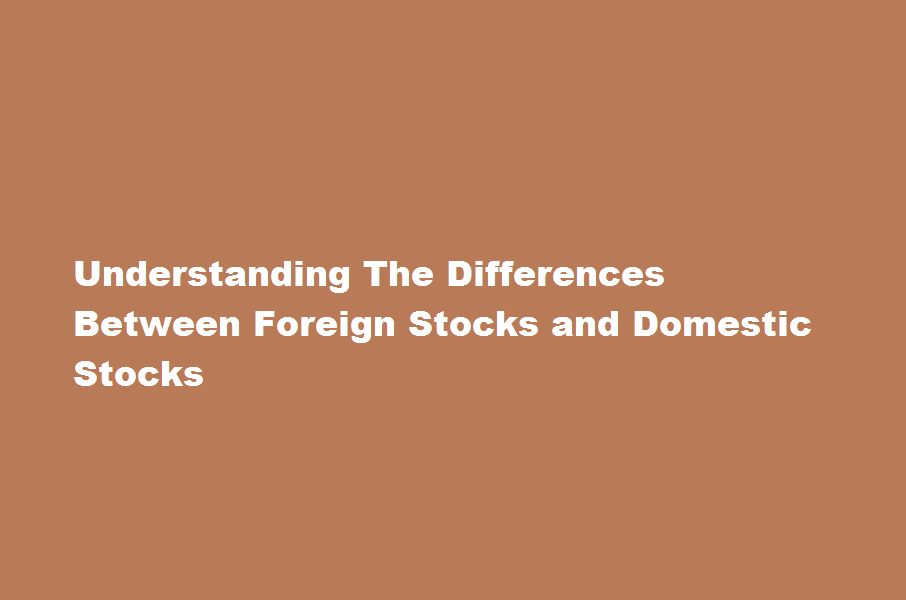Understanding The Differences Between Foreign Stocks and Domestic Stocks
4 min read
Introduction
Investing in stocks can be a rewarding way to grow wealth, and investors have the option to choose between domestic stocks (those from their own country) and foreign stocks (stocks from other countries). While they share some similarities, there are crucial differences that investors should consider before venturing into either market. This article aims to shed light on the distinctions between foreign stocks and domestic stocks, enabling investors to make more informed decisions.
Market Dynamics
One significant difference between foreign stocks and domestic stocks lies in their respective market dynamics. Domestic stock markets are influenced by local factors such as economic indicators, political stability, and domestic regulations. Foreign stock markets, on the other hand, are affected by a broader range of factors, including global economic trends, geopolitical events, and currency fluctuations.
Economic Conditions
The economic conditions of a country play a vital role in determining the performance of domestic stocks. Factors like GDP growth, inflation rates, interest rates, and consumer spending patterns have a direct impact on the profitability and valuations of domestic companies. In contrast, foreign stocks are influenced by the economic conditions of the countries where the companies are based. Investors need to analyze and understand the economic climate of different countries when investing in foreign stocks.
Regulatory Environment
Regulatory environments differ across countries, and this disparity affects how companies operate and investors participate in the stock market. Domestic stocks are subject to the regulations and reporting requirements of the investor’s home country. In contrast, foreign stocks may be subject to different regulatory frameworks, accounting standards, and disclosure requirements, which can vary in transparency and investor protection. Understanding these regulatory differences is crucial for investors considering foreign stock investments.
Currency Fluctuations
Currency fluctuations are another significant aspect that sets foreign stocks apart from domestic stocks. When investing in foreign stocks, investors are exposed to exchange rate risk. Currency movements can influence investment returns, as gains or losses can arise from both the stock performance and changes in the exchange rate between the investor’s currency and the foreign currency in which the stock is denominated.
Geopolitical Risks
Geopolitical risks, such as political instability, trade disputes, or regional conflicts, can have a substantial impact on foreign stocks. Domestic stocks are generally more insulated from such risks since they operate within the investor’s home country. Investors interested in foreign stocks must closely monitor geopolitical events and assess their potential impact on the countries and companies they are considering.
Frequently Asked Questions
Are foreign stocks riskier than domestic stocks?
Foreign stocks carry additional risks due to factors like currency fluctuations, regulatory differences, and geopolitical risks. However, risk levels can vary depending on the country and specific investments. Thorough research and diversification can help manage these risks.
How can I access foreign stocks?
Investors can access foreign stocks through various means, including international brokerage accounts, exchange-traded funds (ETFs), and American Depository Receipts (ADRs). These vehicles allow investors to trade foreign stocks on their local exchanges.
Are foreign stocks more profitable than domestic stocks?
Profitability depends on numerous factors and can vary over time. While foreign stocks may offer unique growth opportunities, domestic stocks can also deliver strong returns. It’s essential to assess individual stocks based on their fundamentals and growth potential.
Do I need to consider different tax implications for foreign stocks?
Yes, investing in foreign stocks may have tax implications. Taxation on foreign stock investments can be influenced by factors such as tax treaties, foreign withholding taxes, and reporting requirements. Consulting with a tax advisor is advisable to understand the specific tax implications in your country.
Can I diversify my portfolio by investing in foreign stocks?
Yes, investing in foreign stocks can provide diversification benefits by exposing your portfolio to different economies, industries, and currencies. Diversification helps reduce the risk of overexposure to a single market.
Conclusion
Foreign stocks and domestic stocks differ in terms of market dynamics, economic conditions, regulatory environments, currency fluctuations, and geopolitical risks. Investors should carefully consider these distinctions before investing in either market. Assessing risk levels, understanding regulatory disparities, and monitoring currency movements are crucial steps to navigate the world of foreign stocks successfully. By taking a well-informed approach and leveraging the advantages of both types of investments, investors can build a diversified and robust portfolio.
Read Also : Investing in Foreign Stocks A Guide for Investors in Your Country






